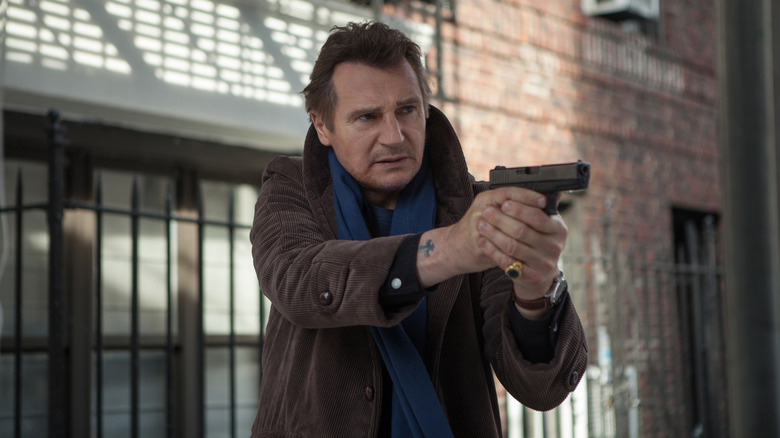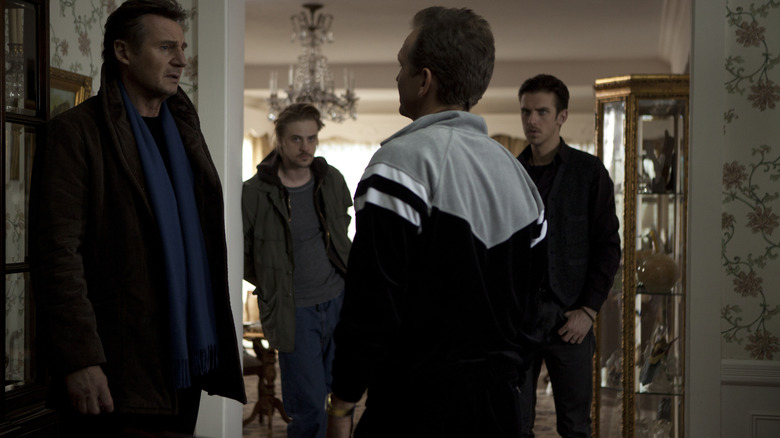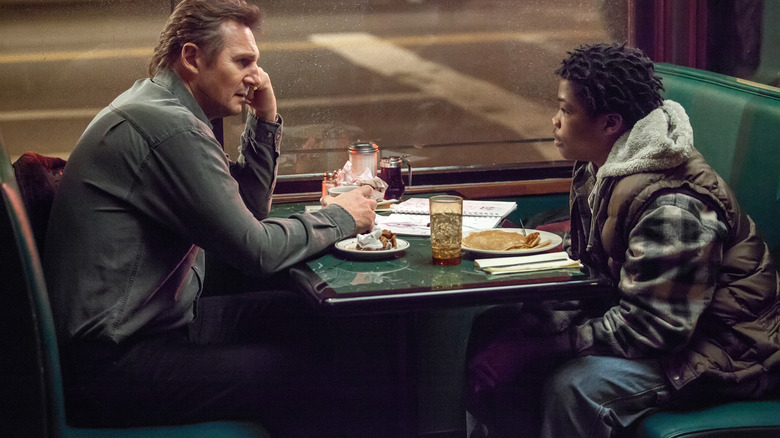The Daily Stream: Redemption Proves Elusive In A Walk Among The Tombstones
(Welcome to The Daily Stream, an ongoing series in which the /Film team shares what they've been watching, why it's worth checking out, and where you can stream it.)
The Movie: "A Walk Among the Tombstones"
Where You Can Stream It: HBO Max
The Pitch: How can you tell when a Liam Neeson movie is worth watching? For the most part, the answer is when it doesn't exactly break out in theaters and isn't done any favors by its marketing campaign. No, I won't go so far as to say that "A Walk Among the Tombstones" ought to go right up there alongside the likes of the criminally underseen Martin Scorsese masterpiece "Silence" or Steve McQueen's excellent "Widows," but this 2014 neo-noir thriller at least comfortably fits within the general mold of a film like "The Grey," where the promise of typical Neeson-style action somewhat overshadows the far more interesting ideas at play than viewers may have expected.
Why It's Essential Viewing
Right off the bat, "A Walk Among the Tombstones" lets you know exactly the kind of movie it is. In the span of its opening five minutes, Liam Neeson's alcoholic police detective drops a racial slur and an F-bomb, downs two shots of hard liquor with his morning coffee, and engages in a frenzied street shoot-out before the evocative opening credits sequence turns into a nightmarish tableau that lays bare the film's nasty (and oftentimes slightly too cartoonish) villains, played by Adam David Thompson and a particularly chilling David Harbour. Needless to say, Matthew Scudder isn't exactly a great guy, even eight years removed from the initial scene when he's since retired from the NYPD, regularly attending Alcoholics Anonymous meetings, and taken up a shady side practice as an unlicensed private detective. When his latest client, wealthy drug trafficker Kenny Kristo (a reliably compelling and slightly sinister Dan Stevens), recruits his services and questions why he left the police force in the first place — "The corruption got to you, huh?" — Scudder matter-of-factly responds, "Not really. It would have been hard to support my family without it."
With the exception of later revelations regarding that opening shootout (which is immediately given away in the official trailer, anyway), we receive very few details about Scudder's background, his estranged family, or his time on the beat ... something that most other action films probably would have felt compelled to shoehorn in, via clunky flashbacks or exposition. Though this minimalist choice by writer and director Scott Frank ("Minority Report," "Logan," "Godless," "The Queen's Gambit") may alienate some viewers, it leaves us to learn as much as we can about this mysterious lead character through his day-to-day work, as he investigates the sick individuals who kidnapped Kristo's wife, solicited hundreds of thousands of dollars in ransom money, and then murdered her anyway. The grisly details of the murder that soon turns into serial ones easily live up to the film's neo-noir billing, with the foreboding score and deceptively impressive camerawork keeping us at an emotional distance from Scudder — until, that is, he compassionately helps out homeless orphan TJ (Brian "Astro" Bradley), who soon takes on a classic gunslinger/young sidekick dynamic to Neeson's gritty, technology-averse loner.
Something Better Than Redemption
The bulk of the film is set in New York City in 1999, with the uncertainty of Y2K looming on the horizon and the as-of-yet unseen specter of 9/11 rapidly approaching on its heels. In the midst of these "last days" before the onset of massive amounts of change, Scudder and TJ plod along with their daily investigations, simply trying to survive one day at a time as the mystery deepens and becomes ever more deadly. Not all the disparate pieces of this film come together quite as well as they should, but Scudder and TJ (who yearns for a much cooler and PI-friendly name, like former Minnesota Vikings quarterback Daunte Culpepper) serve as the heart and backbone of "A Walk Among the Tombstones," providing Scudder with the barest glimpse at possible redemption for his past sins if he can only do right by this directionless, but promising kid. A scene where Scudder first teaches TJ how to use a gun before thoroughly chewing him out for even having one in his possession in the first place is a stand-out highlight, with Neeson effortlessly nailing the disapproving father figure role with an appropriately deadpan delivery. "Don't feel sorry for me" quickly turns into a sort of mantra between them, further suggesting that the only way forward is, well, forward.
For better or worse, the film ultimately feels more concerned with putting the pieces in place for a final confrontation rather than walking Scudder (and, by extension, us) through the details of his actual investigative work, and it misses some key opportunities for emotional resonance and originality along the way. But even with one hand tied behind its back, the story still gives viewers a reason to care through the lifeline of Scudder and TJ, amid their spiraling descent into the depths of New York's criminal underbelly. The ultimate conclusion is perhaps a little too on-the-nose and wraps up a bit too conveniently, but the final emotional note leaves just enough ambiguity to make Scudder's journey feel earned. By dangling redemption just out of reach, "A Walk Among the Tombstones" aims for something even nobler — the idea of preventing others from making the same mistakes that we did.


